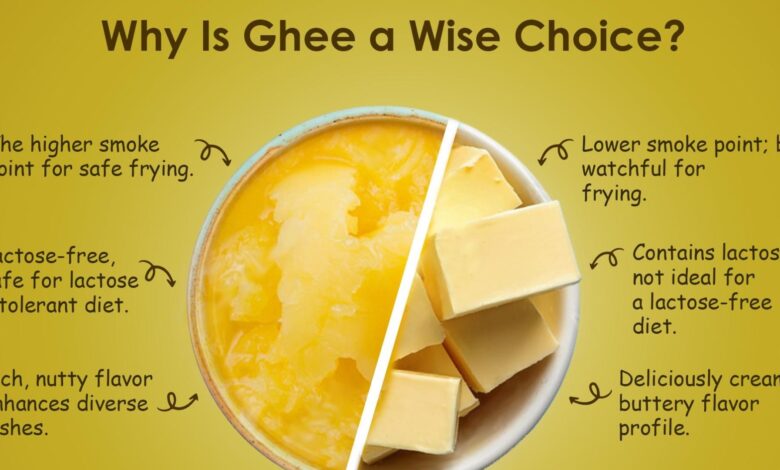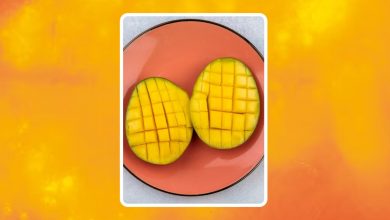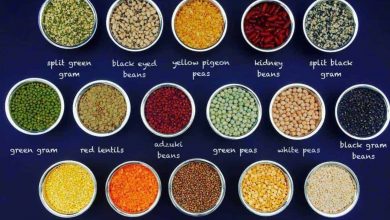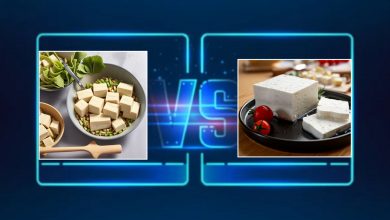Butter or Ghee: Which Is Better for You?

Regarding culinary fats: butter and ghee are two popular choices with distinct flavors and nutritional profiles. We will try to understand the differences and benefits that can help you make informed decisions about which one to use in your regular eating routine. Also, we explore the assessments among margarine and ghee, focusing in on their effects on weight the leaders, cholesterol levels, heart prosperity, and dietary substance.
Butter or Ghee: Nutritional Comparison
Both milk butter and ghee are rich in fat-soluble vitamins such as vitamins A, D, E, and K. These vitamins are essential for various bodily functions, including vision, immunity, bone health, and blood clotting. Ghee, due to the clarification process, has a slightly higher concentration of these vitamins compared to butter.
Butter: Butter is made by churning cream or milk to separate the butterfat from the buttermilk. It contains varying amounts of milk solids and water which contribute to its creamy texture and flavor. Nutritionally, butter is rich in saturated fats and contains vitamins A, D, E, and K2. It is widely used in cooking and as a spread due to its flavor-enhancing properties.
Ghee: Ghee, also known as clarified butter, is made by heating butter to remove water and milk solids, leaving behind pure butterfat. Ghee has a higher smoke point than butter as a result of this process, making it suitable for high-heat cooking techniques like frying and sautéing. Ghee is a good option for people who are lactose intolerant or have milk allergies because it does not contain any milk proteins and does not contain lactose.
Butter or Ghee for Weight Loss
Choosing between butter or ghee for weight loss can be challenging. Ghee, which is clarified butter, has a higher concentration of fats and calories but contains no lactose or casein, making it easier to digest for some individuals. Ghee is rich in medium-chain triglycerides (MCTs), which are known to promote fat-burning and aid in weight loss. However, moderation is key, as both ghee and butter are calorie-dense.
Ghee vs. Butter Calories
When comparing ghee vs. butter in terms of calories, ghee is slightly more calorically dense. One tablespoon of ghee contains approximately 120 calories, while the same amount of butter contains about 102 calories. This difference is due to ghee’s higher fat content, as the water and milk solids are removed during the clarification process.
Impact on Cholesterol Levels
Contrary to traditional beliefs, both butter and ghee can impact cholesterol levels differently:
- Butter: Contains saturated fats, which, when consumed in excess, can raise LDL (bad) cholesterol levels.
- Ghee: Contains short-chain and medium-chain fatty acids that may not have the same negative impact on cholesterol levels as long-chain saturated fats found in butter. Some studies suggest that ghee may even raise HDL (good) cholesterol levels.
Is Ghee Better Than Butter for High Cholesterol?
Ghee has been traditionally viewed as a healthier option for cholesterol management. Unlike butter, ghee contains higher levels of conjugated linoleic acid (CLA), which might assist with lessening muscle to fat ratio and further develop lipid profiles. However, ghee also contains a lot of saturated fat, which may cause LDL cholesterol levels to rise. Thus, individuals with high cholesterol should consume ghee in moderation and consult with a healthcare provider.
Effect on Heart Health
The debate over whether ghee or butter is better for heart health continues:
- Butter: High in saturated fats, which in excessive amounts may contribute to heart disease risk factors.
- Ghee: Contains butyrate, a short-chain fatty acid that may have anti-inflammatory properties and support gut health, potentially benefiting overall heart health when consumed as part of a balanced diet.
Is Ghee Bad for Cholesterol?
The impact of ghee on cholesterol levels is nuanced. While ghee can increase HDL (good) cholesterol, it can also raise LDL (bad) cholesterol if consumed in large quantities. Individuals concerned about their cholesterol levels should monitor their intake and consider their overall dietary pattern.
Nutritional Content and Vitamins
Both butter and ghee provide essential fat-soluble vitamins:
- Butter: Rich in vitamins A, D, E, and K2, which play roles in vision, bone health, immune function, and blood clotting.
- Ghee: Retains these fat-soluble vitamins but is free from lactose and milk proteins, making it a suitable alternative for those with dairy sensitivities.
Conclusion: Making the Right Choice
The choice between butter and ghee depends on individual dietary preferences, health goals, and nutritional needs. While butter is versatile and flavorful, ghee offers the benefits of lactose-free purity and a higher smoke point for cooking. When considering which option is healthier, moderation is key. Incorporating either butter or ghee into a balanced diet, alongside a variety of whole foods, fruits, and vegetables, can help achieve optimal health outcomes.
Eventually, talk with a medical care proficient or enrolled dietitian to decide the most ideal decision in view of your particular ailments, dietary limitations, and inclinations.Whether you opt for the rich flavor of butter or the purity of ghee, both can be enjoyed responsibly as part of a well-rounded diet that promotes overall health and wellness.



